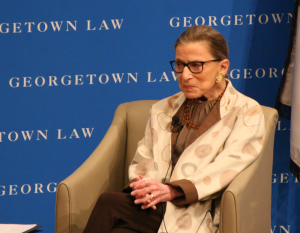
Supreme Court Justice Ruth Bader Ginsburg reflected on her career in the annual Dean’s Lecture at Georgetown University Law Center.
Supreme Court Justice Ruth Bader Ginsburg reflected on her career in law, focusing primarily on her advocacy for gender equality, in the second annual Dean’s Lecture Wednesday in the Hart Auditorium at the Georgetown University Law Center.
The Dean’s Lecture is given to third-year law students. Ginsburg’s colleague Justice Elena Kagan spoke last year in the inaugural event.
In an approximately 350-seat auditorium filled to capacity, Ginsburg spoke with GULC Dean William Treanor in a conversation format.
As in a courtroom, Ginsburg’s entry was marked by the audience standing in silence before she, laughing, asked them to be seated.
Treanor introduced Ginsburg, noting the fandom that surrounds the oldest justice on the Supreme Court and the close relationship between the law center and the Ginsburg family, where the justice’s late husband, Martin Ginsburg, taught for 30 years until his death in 2010.
“We have people in the front row wearing Notorious R.B.G. T-shirts,” Treanor said. “It’s particularly wonderful to have you here, Justice Ginsburg, not only because you’re a great justice, but also because you’d be a historic figure even if you’d never been a judge because of your work for gender equity as an advocate, and also because you’re such a great member of this community.”
The conversation began with Ginsburg reflecting on her first interests in law. The justice grew up in Brooklyn and attended Cornell University as an undergraduate. While she had no interest in being a lawyer before her time at college, the then-rampant McCarthyism and its infringements on free speech made the profession more attractive.
“Being a lawyer is a pretty good thing because in addition to practicing the profession, you could do some good for your society, make things a little better for other people,” Ginsburg said.
Ginsburg noted her interest in an alternate career path, drawing one of many long spells of laughter from the audience.
“If I could have any talent that God would give me, I would be a diva,” Ginsburg said. “Sadly I’m a monotone.”
During the conversation, the justice drew attention to her fight for gender equality throughout her career. Attending Harvard Law School just six years after the school began admitting women, Ginsburg said that the nine women in her class felt as if they were constantly being judged by their 500 male classmates to see if they were fit.
The discrimination continued upon Ginsburg’s graduation from Columbia Law School, where she transferred prior to her final year at Harvard in order to be with her ill husband in New York. Despite graduating at the top of her class, no firm chose to hire her, and even attempts by the hiring officer to help her obtain a clerkship were primarily in vain.
“They were reticent, and the reason was some of them could overcome the fact that I was a women, but none of them that I was the mother of a four-year-old. The fear was that I wouldn’t be able to come in on the weekend, to stay late,” Ginsburg said. “The result was that I overcompensated and worked harder than any clerk.”
Eventually hired as a clerk and then later as a professor at Rutgers Law School, Ginsburg experienced a substantial pay difference between women and men. This, combined with an increased number of female students in her classes and discrimination cases on which she worked for the American Civil Liberties Union, led naturally to her focus on women’s rights.
“I didn’t set my own agenda,” Ginsburg said. “I was fantastically lucky to be born when I was and to be a lawyer.”
The justice discussed cases she brought before the Supreme Court as a lawyer, pointing to one in particular where a single male parent was denied the same Social Security benefits as a female parent, encouraging women to stay at home as evidence of the universal perils of discrimination.
“Gender discrimination was bad for everyone. It was bad for women, it was bad for men, it was bad for the children,” Ginsburg said.
Ginsburg then spoke about her experience on the Supreme Court, referencing how, initially, lawyers would confuse her with Sandra Day O’Connor, the only other woman on the court at the time. However, she noted that the increased presence of women on the court, with the recent additions of Kagan and Justice Sonia Sotomayor, had strengthened the female presence.
“People ask me sometimes, when will there be enough women on the court?” Ginsburg said. “And my answer is, when there are nine. Some people are taken aback. But for most of our history, there were only men on the high court bench.”
Ginsburg concluded by offering advice to the graduating students, imploring them to use their degree in the service of their communities.
“If all I was in the law profession to do was to turn over a buck, I don’t think I would have had nearly the satisfaction that I had. Yes, you need a job, but if you don’t do something outside yourselves, something to repair the tears in your communities, something that will make life a little better for other people, you’re not going to be a true professional,” Ginsburg said.
Madeline Waseel (LAW ’15) said that Ginsburg was inspirational in her fight for gender equality.
“I’m an Afghan-American. For those women who have been inspired by Justice Ginsburg for opening the doors of women in this country, there are a group of us who are inspired to do work for women overseas, whether it’s in Afghanistan or the Middle East,” Waseel said.




















